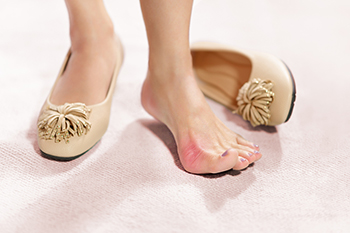

A bunion is a bony bump that forms at the base of the big toe, where it angles toward the second toe. This condition occurs when the bones in the front of the foot shift out of alignment, causing the big toe to lean inward. Over time, the misalignment leads to the formation of a prominent bump on the joint. Symptoms of bunions include pain, swelling, redness, and the development of calluses or corns where the toes rub against the shoe. The pain can worsen with prolonged standing or walking. Common causes of bunions include genetics, wearing tight or ill-fitting shoes, and excessive pressure on the feet. Conditions like arthritis or flat feet can also contribute to the development of bunions. While bunions may be managed with conservative treatments, surgery may be needed for severe cases to restore normal foot function and alleviate pain. If you have symptoms of a bunion, it is suggested that you consult a podiatrist who can guide you toward treatment methods that are right for you.
If you are suffering from bunions, contact Massimo Pietrantoni, DPM of Rochester Podiatry, LLP. Our doctor can provide the care you need to keep you pain-free and on your feet.
What Is a Bunion?
A bunion is formed of swollen tissue or an enlargement of boney growth, usually located at the base joint of the toe that connects to the foot. The swelling occurs due to the bones in the big toe shifting inward, which impacts the other toes of the foot. This causes the area around the base of the big toe to become inflamed and painful.
Why Do Bunions Form?
Genetics – Susceptibility to bunions are often hereditary
Stress on the feet – Poorly fitted and uncomfortable footwear that places stress on feet, such as heels, can worsen existing bunions
How Are Bunions Diagnosed?
Doctors often perform two tests – blood tests and x-rays – when trying to diagnose bunions, especially in the early stages of development. Blood tests help determine if the foot pain is being caused by something else, such as arthritis, while x-rays provide a clear picture of your bone structure to your doctor.
How Are Bunions Treated?
If you have any questions, please feel free to contact one of our offices located in Brighton and Greece of Rochester, NY . We offer the newest diagnostic and treatment technologies for all your foot care needs.